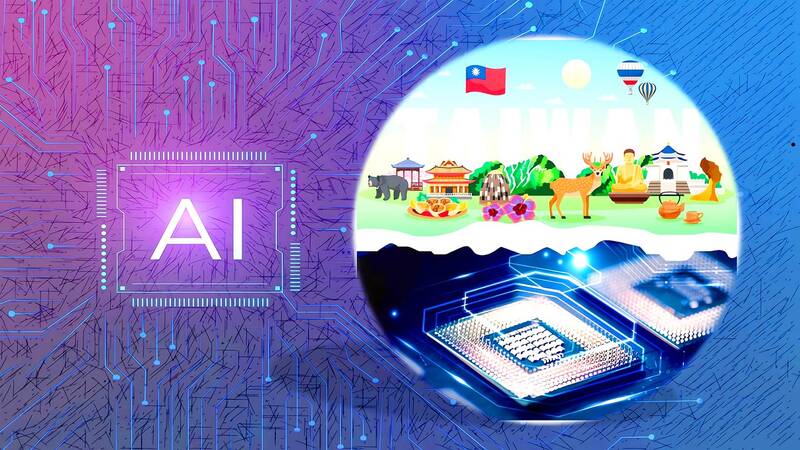對話 Dialogue
清清:華華,別忘了明後天我們要去參加國際半導體展喔!明天上午在捷運南港展覽館站見
Qīngqing: Huáhua, bié wàngle mínghòutiān wǒmen yào qù cānjiā Guójì Bàndǎotǐ Zhǎn o! Míngtiān shàngwǔ zài jiéyùn Nángǎng Zhǎnlǎnguǎn Zhàn jiàn.

Photo courtesy of Freepik 照片:Freepik 提供
華華:放心,我沒忘,這場從9月4號到6號的展覽,是台灣跟亞洲最盛大的半導體盛會,除了展覽,還有多場精彩的論壇,怎麼能錯過?
Huáhua: Fàngxīn, wǒ méi wàng, zhè chǎng cóng jiǔ yuè sì hào dào liù hào de zhǎnlǎn, shì Táiwān gēn Yàzhōu zuì shèngdà de bàndǎotǐ shènghuì, chúle zhǎnlǎn, hái yǒu duō chǎng jīngcǎi de lùntán, zěnme néng cuòguò?
清清:台灣的半導體在世界上佔有相當重要的地位,說起台積電更是家喻戶曉,但我們對它的認識可能還不夠深,真應該好好去學習學習。
Qīngqing: Táiwān de bàndǎotǐ zài shìjiè shàng zhànyǒu xiāngdāng zhòngyào de dìwèi, shuō qǐ Táijīdiàn gèng shì jiāyù hùxiǎo, dàn wǒmen duì tā de rènshì kěnéng hái búgòu shēn, zhēn yīnggāi hǎohao qù xuéxí xuéxí.
華華:今年的主題是探索人工智慧,走向半導體和智慧未來,正是這個時代的關鍵呢!
Huáhua: Jīnnián de zhǔtí shì tànsuǒ réngōng zhìhuì, zǒuxiàng bàndǎotǐ hé zhìhuì wèilái, zhèngshì zhège shídài de guānjiàn ne!
清清:聽說新展區還特別介紹電動車的新趨勢,可以了解汽車產業是怎麼加速布局全球市場的。
Qīngqing: Tīngshuō xīn zhǎnqū hái tèbié jièshào diàndòng chē de xīn qūshì, kěyǐ liǎojiě qìchē chǎnyè shì zěnme jiāsù bùjú quánqiú shìchǎng de.
華華:人類的科技不斷發展,隨著AI浪潮的來臨,半導體一定會迎來更多的創新。
Huáhua: Rénlèi de kējì búduàn fāzhǎn, suízhe AI làngcháo de láilín, bàndǎotǐ yídìng huì yínglái gèng duō de chuàngxīn.
清清:我們就利用這次機會,多學習多交流。
Qīngqing: Wǒmen jiù lìyòng zhè cì jīhuì, duō xuéxí duō jiāoliú.
華華:嗯!期待明天在展場見到更多新技術和新朋友!
Huáhua: En! Qídài míngtiān zài zhǎnchǎng jiàndào gèng duō xīn jìshù hé xīn péngyǒu!
翻譯 Translation
Qingqing: Huahua, don’t forget that we are attending the SEMICON Taiwan 2024 International Semiconductor Exhibition tomorrow and the day after. Let’s meet tomorrow morning at the Nangang Exhibition Center MRT station.
Huahua: Don’t worry, I haven’t forgotten. This exhibition, held from Sept. 4 to 6, is the biggest semiconductor event in Taiwan and Asia. Besides the exhibitions, there are also many exciting forums. How could I miss it?
Qingqing: Taiwan holds a significant position in the global semiconductor industry. TSMC is a household name, but our understanding of it might still be incomplete. This is a great opportunity to learn more about it.
Huahua: This year’s theme is about exploring AI: leading the semiconductor and intelligent future, which is so relevant to our times.
Qingqing: I heard there’s a new section specifically introducing the latest trends in electric vehicles, which will show how the automotive industry is accelerating its global market presence.
Huahua: Human technology keeps advancing, and with the rise of AI, the semiconductor industry is bound to see more innovations.
Qingqing: Let’s make the most of this opportunity to learn and network.
Huahua: Absolutely. I’m looking forward to seeing more new technologies and meeting new people at the exhibition tomorrow.
生詞 Vocabulary
1. 半導體 (bàndǎotǐ) semiconductor
2. 論壇 (lùntán) forum
3. 台積電 (Táijīdiàn) TSMC
4. 家喻戶曉 (jiāyù hùxiǎo) [idiom]
household name
5. 探索 (tànsuǒ) explore
6. 人工智慧 (réngōng zhìhuì) AI
7. 產業 (chǎnyè) industry
8. 浪潮 (làngcháo) wave, surge
教材音檔 Audio Files
國立清華大學華語中心提供
By National Tsing Hua University Chinese Language Center:

In an effort to fight phone scams, British mobile phone company O2 has introduced Daisy, an AI designed to engage phone con artists in time-wasting conversations. Daisy is portrayed as a kindly British granny, exploiting scammers’ tendency to target the elderly. Her voice, based on a real grandmother’s for authenticity, adds to her credibility in the role. “O2” has distributed several dedicated phone numbers online to direct scammers to Daisy instead of actual customers. When Daisy receives a call, she translates the scammers’ spoken words into text and then responds to them accordingly through a text-to-speech system. Remarkably, Daisy

Bilingual Story is a fictionalized account. 雙語故事部分內容純屬虛構。 Emma had reviewed 41 resumes that morning. While the ATS screened out 288 unqualified, she screened for AI slop. She could spot it a mile away. She muttered AI buzzwords like curses under her breath. “Team player.” “Results-driven.” “Stakeholder alignment.” “Leveraging core competencies.” Each resume reeked of AI modeling: a cemetery of cliches, tombstones of personality. AI wasn’t just changing hiring. It was draining the humanity from it. Then she found it: a plain PDF cover letter. No template. No design flourishes. The first line read: “I once tried to automate my

Every May 1, Hawaii comes alive with Lei Day, a festival celebrating the rich culture and spirit of the islands. Initiated in 1927 by the poet Don Blanding, Lei Day began as a tribute to the Hawaiian custom of making and wearing leis. The idea was quickly adopted and officially recognized as a holiday in 1929, and leis have since become a symbol of local pride and cultural preservation. In Hawaiian culture, leis are more than decorative garlands made from flowers, shells or feathers. For Hawaiians, giving a lei is as natural as saying “aloha.” It shows love and

1. 他走出門,左右看一下,就過了馬路。 ˇ He walked outside, looked left and right, and crossed the road. χ He walked outside and looked left and right, crossed the road. 註︰並列連接詞 and 在這句中連接三個述語。一般的結構是 x, y, and z。x and y and z 是加強語氣的結構,x and y, z 則不可以。 2. 他們知道自己的弱點以及如何趕上其他競爭者。 ˇ They saw where their weak points lay and how they could catch up with the other competitors. χ They saw where their weak points lay and how to catch up with the other competitors. 註:and 一般連接同等成分,結構相等的單詞、片語或子句。誤句中 and 的前面是子句,後面是不定詞片語,不能用 and 連接,必須把不定詞片語改為子句,and 前後的結構才相等。 3. 她坐上計程車,直接到機場。 ˇ She took a cab, which took her straight to the airport. ˇ She took a cab and it took her straight